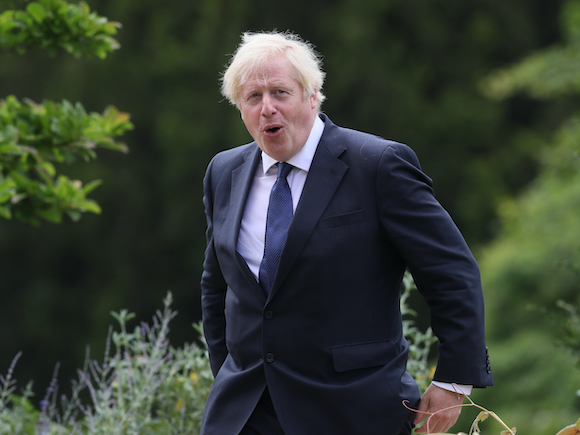If some things these days are terrifyingly new, other things never seem to change at all. Despite the chaos of coronavirus, the last week has seen the return of a time-worn tradition: agonising about a no-deal Brexit. On Saturday, the Sun revealed the contents of a leaked government document which laid bare the potential fiasco coming in January. Added to the familiar warnings of paralysed goods traffic and food and medicine shortages was a wave of animal disease, troops on the streets to combat civil disorder, and the need to airdrop food on the Channel Islands.
At the same time, the journalist Tim Shipman reported in the Sunday Times that some figures in Downing Street were stoical about no deal and even welcomed it. He quoted one former official as declaring no deal the means to “get the press...and public back on side.” The government would, apparently, “dig their heels in [and] throw some European red meat.” In other words, No 10 can not only enact no deal and blame it on the EU, it may even see no deal as a positively helpful distraction.
The key to this, as always in Brexit, is about shifting the blame. Brexiters have always blamed Remainers, civil servants and journalists for the inevitable failure of their project—but the principal target has always been the supposedly intransigent EU. As long ago as 2017, some commentators predicted that Theresa May might seek a no-deal default and impugn Brussels. The problem is that the plan would never have worked then, and will not work now.
The first obstacle is that no deal will be a disaster, and disasters do not raise spirits. News of restrictions and hardship reminiscent of wartime may surprise anyone who had associated no deal with the sunny-sounding “Australia outcome” of the government’s Orwellian imagination.
And so the government may look to the virus. That was a disaster which did, briefly, unite the people. But nobody voted for Covid-19 or could blame the government for the fact it existed. The national solidarity which flourished between March and May was a product of shared involuntary adversity and a collective pride in the frontline workers combating it. That seems unlikely in the case of no deal, an entirely man-made crisis. Will a weekly clap for lorry drivers in Dover raise national morale or mitigate deliberate economic implosion?
There is, in fact, an important lesson from the virus, but it is one the government has not yet begun to understand. Our national solidarity this spring was not in aid of No 10 but of the NHS; not shared with Dominic Cummings but with one another. When crises were exposed not as the inevitable consequence of the virus but a failure to tackle it, the government’s popularity fell. Covid-19 did not require the eye test at Barnard Castle, or the lie about protective rings around care homes, or the calamity of A-level results. Those problems were the result of arrogance and incompetence, and they have cost the Conservatives trust.
The key political difficulty for the government is mismanaged expectations. It won the election on the grounds of an “oven-ready deal.” Many voters did not perhaps appreciate that the deal was simply the divorce agreement—still less that it offered no guarantee against economic collapse. And the more time spent in the transition period, the more we have come to associate Brexit with no change at all. Even many Remainers cannot conceive of the trouble awaiting us, because the government has always denied it will take place. The prospect now of food shortages and infrastructural breakdown will not earn the Conservatives sympathy.
The government knows this, so turns to an old theme. Enraged by our independence, the EU must be out for revenge. Thus the new checks and delays at the border will be Brussels “imposing new restrictions” or “EU red tape blocking British businesses.” The sad and banal truth is that, as Brexit meant Brexit, no deal simply means no deal. The default in international trade is the existence of comprehensive barriers between third countries, and only an agreement removes them.
Covid-19 makes people less, not more likely to tolerate destruction. They have suffered quite enough already, and will recognise this new crisis was a choice. Really the blame game taps into Brexit’s kryptonite: the admission that, despite everything said in 2016 and for nearly four years afterwards, leaving has consequences and they are overwhelmingly damaging. This has not, after all, proved the “easiest deal in human history” and we did not “hold all the cards.” The new narrative concedes that the EU has power and interests and we have landed on the wrong side of them. A need to attribute blame acknowledges, once and for all, that Brexit will not present “opportunities”: it pre-supposes colossal damage. Then, as a final insult, the government expects the British people to valiantly shrug that off in a show of patriotic defiance.
Voters never blame themselves and can't turf out the European Commission. The fundamental irony about the blame game is that there is, of course, someone responsible and always has been. For years the UK took the credit for collective victories and deflected the blame for individual failures, turning the EU into a convenient scapegoat. But the point of Brexit is we are now going it alone. Having freed ourselves from the imagined shackles of Brussels, we necessarily free ourselves from its culpability as well. The public will now see the truth closer to home.
The return of the Brexit blame game is the Conservatives’ stupidest gamble yet
No 10 will not be able to lay responsibility for a no-deal outcome at Brussels’ door
August 27, 2020

Who ya gonna blame? Photo: Brian Lawless/PA Wire/PA Images











